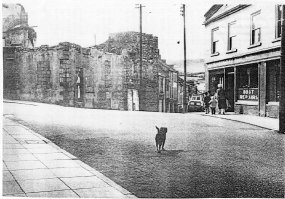Although the Bagenal dynasty stretched into the seventeenth and early eighteenth centuries in Newry, the only men to impact on the larger Irish stage were the first and second, Nicholas and his son Henry.
Both held the post of Marshal of the royal forces in
A near relative Sir Sidney Bagenal held the reins until the coming-of-age of Arthur, Henry’s son. Later Arthur’s son, another Nicholas, held sway, but Newry had long-since ceased to feature prominently in national affairs. This seventeenth century also was disastrous for the town’s prosperity as first one side and then the other occupied it. Towards the end of these wars it was burned to the ground.
Primarily we must understand the character and assess the contribution of the first Bagenal, Nicholas, fugitive son of a Stafford Mayor.
An arrogant and highly ambitious man, in his early years he acquired a fearsome military reputation (first in Catholic France, then in
‘.. that the oldest man in
Such a man could not long be denied a seat on that same Privy Council!
Bagenal acquired a detestation of all things Catholic and Irish, including the people, their language, customs, beliefs and lifestyle. He was determined to suppress both them and their Church and Monastery, to supplant the Cistercians, to take the Lordships of Newry and of Mourne, to carve a military role for himself as Marshal and a political role as Privy Councillor and as M.P.
In Newry, Bagenal was essentially a precursor of the Planters of the early seventeenth century: he received a grant of the (dissolved i.e. seized!) monastic possessions: in the early years of the new century also his grandson was duly rewarded by James I (during whose reign the Plantation of Ulster took place) with the town’s charter and the powers of the Cistercian monks in Newry. Indeed the Bagenals applied for permission to import Protestant people and families, for commerce and trades, and Nicholas specifically welcomed law-breakers – while precluding only the worst kind.
Now we will focus on Bagenal’s developing career over the Tudor period, and specifically on the year 1550 when he first occupied the Abbot’s House.
… Bagenal Dynasty II …
